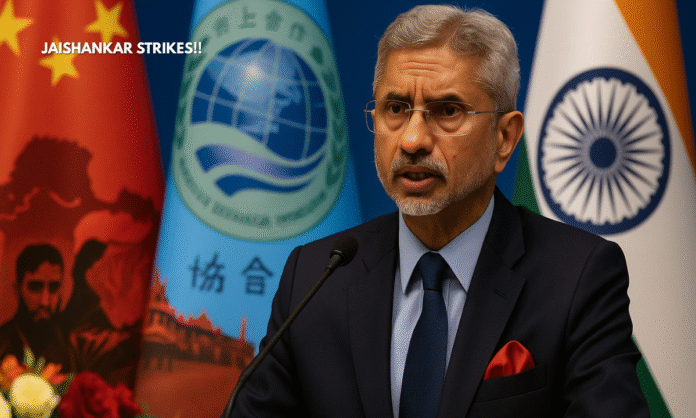Summary
- At the SCO Foreign Ministers’ Meet in China, Jaishankar condemned the April 22 Pahalgam attack and called for accountability.
- Emphasized that terrorism, separatism, and extremism must be confronted collectively and without compromise.
- Urged SCO to deepen regional cooperation amid rising global disorder, conflict, and economic instability.
“No Compromise on Terrorism”: Jaishankar Puts Pahalgam Attack on SCO Agenda
During his high-profile visit to China for the Shanghai Cooperation Organisation (SCO) Foreign Ministers’ Council, External Affairs Minister S. Jaishankar directly confronted the issue of cross-border terrorism by referencing the April 22 Pahalgam terror attack, in which 26 civilians lost their lives.
Speaking at the summit in Tianjin, Jaishankar stressed that the attack was not just a blow to India’s internal security, but a deliberate attempt to undermine Kashmir’s tourism economy and ignite religious divisions in the region.
Quoting the UN Security Council’s condemnation of the attack, he said:
“It underlined the need to hold perpetrators, organisers, financiers and sponsors of this reprehensible act of terrorism accountable.”
In a forum where India shares membership with Pakistan, China, Russia, and Central Asian republics, Jaishankar’s remarks were a bold diplomatic move—placing terror financing and accountability at the center of regional cooperation discussions.
Participated in the SCO Council of Foreign Ministers Meeting this evening in Tianjin.
— Dr. S. Jaishankar (@DrSJaishankar) July 15, 2025
Highlighted that:
➡️ We meet at a time of considerable disorder in the international system. In the last few years, we have seen more conflicts, competition and coercion. Economic… pic.twitter.com/w8XKZ4FLe2
SCO’s Founding Goals Revisited: Time to Walk the Talk
- SCO was created to counter terrorism, separatism, and extremism—Jaishankar urged members to uphold those principles.
- Warned against selective silence on terrorism based on bilateral or geopolitical interests.
- Stated that these “three evils” are increasingly intertwined and must be addressed collectively.
- Urged SCO to maintain its foundational integrity amid rising regional instability.
Without directly naming Pakistan or its sympathizers, Jaishankar made it clear that SCO must not become a passive platform in the face of state-sponsored or transnational terrorism.
“It is imperative that the SCO, to remain true to its founding objectives, take an uncompromising position on this challenge.”
His statement comes at a time when India has taken Operation Sindoor forward to combat terror safe havens across the LoC and has increasingly used global platforms to isolate nations seen as enablers of terrorism.
By highlighting the UN’s strong language on Pahalgam and pushing for collective accountability, India is not only internationalizing its domestic security concerns, but also testing the diplomatic will of the SCO framework.
Multipolarity, Disorder, and India’s Call for Regional Unity
- Jaishankar said global conflicts, economic instability, and coercion are intensifying.
- Argued for deeper regional trust and cooperation to stabilise the world order.
- Positioned SCO as an emerging pole of global influence amid multipolar transition.
- Urged member-states to work on a “shared agenda” to address common threats.
Jaishankar’s remarks also zoomed out to the broader geopolitical context: a world in flux, where alliances are shifting, and the rules-based order is under pressure from great power rivalry, debt crises, and technological disruption.
“We meet at a time of considerable disorder in the international system… Our ability to contribute to the shaping of world affairs will naturally depend on how well we come together on a shared agenda.”
India’s message was clear: SCO must evolve from a talk shop to a strategic forum, capable of building resilient economies, securing borders, and resisting coercion—whether from military forces, economic pressure, or ideological extremism.
India-China Dynamics: Cooperation Despite Friction
- This was Jaishankar’s first China visit since the 2020 Galwan Valley clash.
- Despite bilateral tensions, India engages multilaterally through forums like SCO.
- No bilateral with Wang Yi reported yet, but presence at SCO signals India’s commitment to regional multilateralism.
- India seeks to counterbalance Chinese influence in SCO via shared security and economic goals.
While the SCO stage allowed for regional engagement, the shadow of Galwan still looms over India-China ties. Jaishankar’s presence in China marks an effort to separate strategic multilateralism from unresolved border tensions, but also subtly signals that India’s role in shaping regional narratives will not be muted by past conflicts.
It also reinforces India’s strategic positioning as a pole in a multipolar world, capable of talking tough on terrorism while advocating for cooperative frameworks that sideline coercion.
Final Verdict: Diplomacy with a Red Line
Jaishankar’s address at the SCO Foreign Ministers’ Meeting was measured but firm—a statement of India’s non-negotiable stance on terrorism, a push for greater regional responsibility, and a call to action in a chaotic world order.
By putting the Pahalgam attack on the SCO agenda, India has made it clear that regional cooperation cannot come at the cost of security blind spots. For SCO to remain credible, it must move beyond rhetorical unity and confront the hard issues it was founded to solve.


